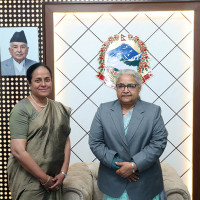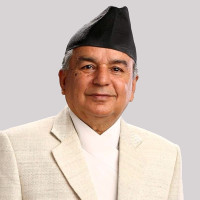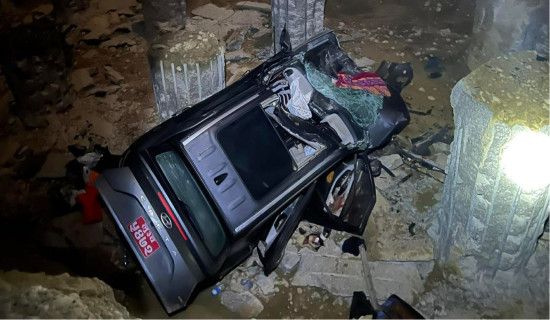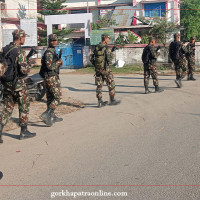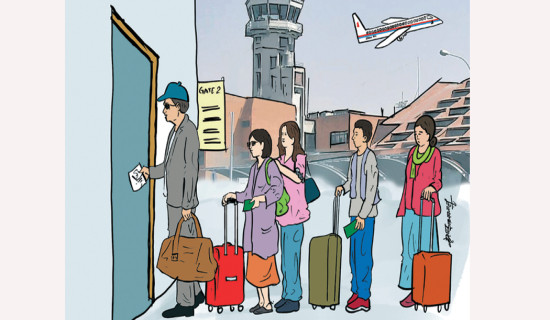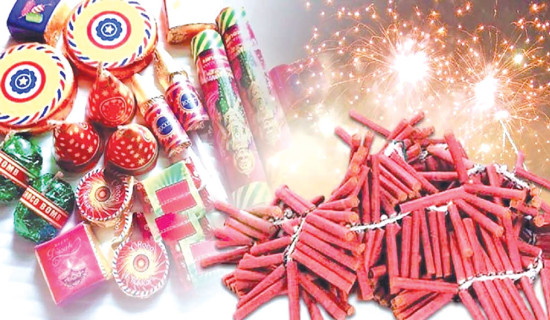- Thursday, 5 February 2026
Security is foremost requisite for successful polls
Kathmandu, May 8: Security concern comes first and foremost at everyone’s mind when elections come.
The country is just five days away from second local level elections slated for May 13 after successful conduction of the three-tier elections in 2017.
Two other elections of the parliamentary and provincial are also happening this year. At this point, the main and only governing body, the Ministry of Home Affairs (MoHA) and the security agencies have been engaged in a series of security deliberations on possible challenges.
By and large, the elections this time are taking place in a different situation in terms of security and political perspectives. The elections this time are going to be largely peaceful as some small parties and armed outfits, boycotting the polls and threatening to disrupt it, have already joined the mainstream of national politics, the government officials said.
Security experts and the government officials involved in analysing the security situation said there, however, are concerns regarding security in light of rifts in those parties that will be fighting elections.
Joint Secretary and Spokesperson for the Home Ministry Phadindra Mani Pokhrel said that the Ministry had already directed all 77 district administration offices (DAOs) to monitor party rifts and divisions and possible challenges to election security.
The Ministry has instructed the DAOs to analyse if clashes are possible among the parties, he said. As of preparing this report, one clash was reported in West Rukum on Wednesday between Nepal Tarun Dal of the ruling Nepali Congress (NC) and YCL of CPN-Maoist Centre. Leaders have, however, never stopped themselves from resorting to war of words.
Mobilisation of security
According to Joint Secretary Pokhrel, the mobilisation of security personnel, which began 30 days before the polling, will continue till the victory rallies of the parties are over.
"Security personnel have now reached the office of the Chief Election Officers, the Returning Officers, and a team of five armed police personnel has reached each office," he added.
"The security personnel including temporary police will reach each polling station and booth across the country by May 8-9. Mobile patrol teams have already been mobilised," said Pokhrel.
According to the Ministry of Home Affairs, all polling stations will have three levels of security ring. The first level or inner ring will be guarded by the team of Nepal Police and temporary police, Armed Police Force in the second and Nepali Army in the third or outer ring. According to Election Commission Nepal (ECN), 79 political parties, including known and never-heard ones, have been on the election fray. But, this time, a direct contest was taking place between the ruling coalition of five parties – the Nepali Congress (NC), CPN (Maoist Centre), CPN (Unified Socialist), the Janata Samajbadi Party led by Upendra Yadav, and Janamorcha Nepal of Chitra Bahadur KC and the main opposition CPN-UML.
Threat of intra-party rift & conflict between parties
For political analyst Dr. Surendra KC, parties especially the communist party leaders lately have been engaged in a war of words, levelling allegation against each other. The intensity of such accusations and counter-accusations and mudslinging has heightened these days as the polls date is just few days away. Analyst KC feared that such allegations and counter-allegations could instigate their cadres to resort to violence. There are some intra-party rifts within the coalition partners. Though the ruling coalition had decided to forge electoral alliance and move ahead till the federal election, there is a chance of intra-party rift and conflict between parties which could be biggest threats during the elections, Dr. KC said.
Joint Secretary Pokhrel, who is one of the members of the election security meeting to be led by Home Minister, said that the Ministry was briefed about chances of inter-party cadre clash in the local bodies and had asked the security agencies to monitor it carefully.
Rajendra Singh Bhandari, former AIG of Nepal Police, said he has not sensed any serious security threat this time like in 2017 election.
“Our Terai belt, which is always vulnerable to security threats and during the election period, illegal weapons could be sneaked into Nepal. When we will be able to manage these issues, elections will be held in a free, fair and fearless manner, AIG Bhandari said. Threats from political parties who boycott the elections and armed outfits, if there are any, pose a minimum security threat this time, said Bhandari.
The Home Ministry has also urged all 77 DAOs to review and evaluate the international border checkpoints, criminal groups, activities of cadres of political parties from across the political spectrum, possible encounters between the cadres.
Over 265,000 security forces for local polls
According to officials from three security bodies, there will be a total of 165,000 security personnel to be deployed for the security of polls. There will be additional 100,000 temporary policemen.
Nepali Army Spokesperson and Brigadier General Narayan Silwal, said that more than 71,000 military personnel would be there for election security. The mobilisation of army had also been endorsed by the President on April 12. Silwal said that the army would be deployed in the designated areas in coordination and cooperation with the District Security Committee and the office of the District Chief Election Officers.
Anytime air-patrolling
"In the local level elections security plan, the Nepali Army has been assigned with more than a dozen roles including security of ballot paper printing, transportation, prisons, airports and other important structures," Silwal said.
As part of the assignment, the army has been airlifting all the required ballot papers and boxes up to remote areas. This time, the Home Ministry has also kept private sector’s choppers in ready position for air-based patrolling at any time.
APF to intensify stringent patrolling
The Armed Police Force (APF) Nepal, the semi-paramilitary force, has been given the responsibility of providing security outside the polling stations which are considered to be highly sensitive.
The Armed Force will also be deployed for the protection of Chief Election Officers and the Returning Officers, the office of the District Election Officers, public infrastructures, and office of the foreign diplomatic missions in Nepal.
In the past, Nepal Police was deployed for the security of the Chief Election Officers and the Returning Officers and the District Election Offices. But this time, it was given to the APF as election was going to happen in single phase.
Categorisation of polling stations as per sensitivity
There are 17,733,723 voters registered this time in EC. The EC has fixed a total of 10,756 polling stations and 21,955 polling booths across the country. Out of which, the government has identified 2,946 polling stations as highly sensitive, 4,423 as sensitive and 3,387 as general polling stations from security view.
Bishnu Kumar KC, SSP and spokesperson for Nepal Police Headquarters, said that all needed security preparations were afoot to make the election a success.
He said that the responsibility of overall security related to the election is on their shoulders. "The Armed Police Force and the Nepali Army will work during the election to help the Nepal Police in times of need," he said.
Security budget for polls
Apart from the temporary police, the Nepal Police had demanded a budget of Rs. 9.29 billion for itself. The proposal of Rs 9.29 billion was submitted by the police to the Home Ministry, which then submitted it to the Ministry of Finance for endorsement. A total of Rs. 1.32 billion has, however, been disbursed just for the permanent policemen. The government has made a separate allocation of Rs. 4 billion for the temporary policemen.
APF seeks Rs. 5 billion but gets Rs. 440 million
Likewise, another security organ, the Armed Police Force (APF) had demanded Rs. 4.92 billion, but received only Rs. 445.56 billion. Nepali Army Spokesperson Silwal said they had yet to confirmed how much budget the NA has received in total. But, initially, the government had already provided Rs. 260 million. Nepali Army, in comparison, has received less budget than those received by Nepal Police and APF, he said.




